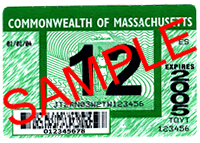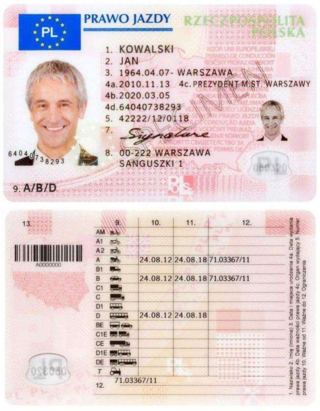Related Research Articles

The Driver and Vehicle Licensing Agency is the organisation of the UK government responsible for maintaining a database of drivers in Great Britain and a database of vehicles for the entire United Kingdom. Its counterpart for drivers in Northern Ireland is the Driver and Vehicle Agency (DVA). The agency issues driving licences, organises collection of vehicle excise duty and sells personalised registrations.

A vehicle registration plate, also known as a number plate, license plate, is a metal or plastic plate attached to a motor vehicle or trailer for official identification purposes. All countries require registration plates for road vehicles such as cars, trucks, and motorcycles. Whether they are required for other vehicles, such as bicycles, boats, or tractors, may vary by jurisdiction. The registration identifier is a numeric or alphanumeric ID that uniquely identifies the vehicle or vehicle owner within the issuing region's vehicle register. In some countries, the identifier is unique within the entire country, while in others it is unique within a state or province. Whether the identifier is associated with a vehicle or a person also varies by issuing agency. There are also electronic license plates.

A department of motor vehicles (DMV) is a government agency that administers motor vehicle registration and driver licensing. In countries with federal states such as in North America, these agencies are generally administered by subnational governments, while in unitary states such as many of those in Europe, DMVs are organized nationally by the central government.
Vehicle insurance is insurance for cars, trucks, motorcycles, and other road vehicles. Its primary use is to provide financial protection against physical damage or bodily injury resulting from traffic collisions and against liability that could also arise from incidents in a vehicle. Vehicle insurance may additionally offer financial protection against theft of the vehicle, and against damage to the vehicle sustained from events other than traffic collisions, such as keying, weather or natural disasters, and damage sustained by colliding with stationary objects. The specific terms of vehicle insurance vary with legal regulations in each region.
Vehicle Excise Duty is an annual tax that is levied as an excise duty and which must be paid for most types of powered vehicles which are to be used on public roads in the United Kingdom. Registered vehicles that are not being used or parked on public roads and which have been taxed since 31 January 1998, must be covered by a Statutory Off Road Notification (SORN) to avoid VED. In 2016, VED generated approximately £6 billion for the Exchequer.

The MOT test is an annual test of vehicle safety, roadworthiness aspects and exhaust emissions required in the United Kingdom for most vehicles over three years old. In Northern Ireland the equivalent requirement applies after four years. The requirement does not apply to vehicles used only on various small islands with no convenient connection "to a road in any part of Great Britain"; no similar exemption is listed at the beginning of 2014 for Northern Ireland, which has a single inhabited island, Rathlin. The MOT test was first introduced in 1960 as a few basic tests of a vehicle and now covers twenty different parts or systems on or in the car.
A vanity plate or personalized plate ; prestige plate, private number plate, cherished plate or personalised registration ; personalised plate or custom plate is a special type of vehicle registration plate on an automobile or other vehicle. The owner of the vehicle pays extra money to have their own choice of numbers or letters, usually portraying a recognizable phrase, slogan, or abbreviation, on their plate. Sales of vanity plates are often a significant source of revenue for North American provincial and state licensing agencies. In some jurisdictions, such as British Columbia, vanity plates have a different color scheme and design.

Automatic number-plate recognition is a technology that uses optical character recognition on images to read vehicle registration plates to create vehicle location data. It can use existing closed-circuit television, road-rule enforcement cameras, or cameras specifically designed for the task. ANPR is used by police forces around the world for law enforcement purposes, including to check if a vehicle is registered or licensed. It is also used for electronic toll collection on pay-per-use roads and as a method of cataloguing the movements of traffic, for example by highways agencies.
The Police National Computer (PNC) is a database used by law enforcement organisations across the United Kingdom and other non-law enforcement agencies. Originally developed in the early 1970s, PNC1 went 'live' in 1974 providing UK police forces with online access to the lost/stolen vehicle database. The vehicle owners application quickly followed giving the police online access to the names/addresses of every vehicle owner in the UK. The Police National Computer started holding nominal information based on the computerisation of criminal records held by the Metropolitan Police and other police forces in the late 1970s. These CRO records could be accessed online in real-time by all UK police forces via the "Names" applications. The PNC now consists of several databases available 24 hours a day, giving access to information of national and local matters. As of 18 January 2021, Kit Malthouse said that there are 13 million person records, 58.5 million driver records, and 62.6 million vehicle records stored on the PNC. The PNC is currently directly managed by the Home Office. Between 2007 and 2012, it was maintained by the National Policing Improvement Agency (NPIA) which inherited the activities of the now disbanded Police Information Technology Organisation (PITO).
Road tax, known by various names around the world, is a tax which has to be paid on, or included with, a motorised vehicle to use it on a public road.
A vehicle licence is issued by a motor registration authority in a jurisdiction in respect of a particular motor vehicle. A current licence is required for a motor vehicle to be legally permitted to be used or kept on a public road in the jurisdiction. Usually a licence is valid for one year and an annual licence fee is payable before a new one is issued.

Motor vehicle registration is the registration of a motor vehicle with a government authority, either compulsory or otherwise. The purpose of motor vehicle registration is to establish a link between a vehicle and an owner or user of the vehicle. This link might be used for taxation or crime detection purposes. While almost all motor vehicles are uniquely identified by a vehicle identification number, only registered vehicles display a vehicle registration plate and carry a vehicle registration certificate. Motor vehicle registration is different from motor vehicle licensing and roadworthiness certification.

Vehicle inspection is a procedure mandated by national or subnational governments in many countries, in which a vehicle is inspected to ensure that it conforms to regulations governing safety, emissions, or both. Inspection can be required at various times, e.g., periodically or on the transfer of title to a vehicle. If required periodically, it is often termed periodic motor vehicle inspection; typical intervals are every two years and every year. When a vehicle passes inspection, often a sticker is placed on the vehicle's windshield or registration plate to simplify later controls, but in some countries—such as the Netherlands since 1994—it's no longer necessary. Inspection stations are places to drive inside to see if a vehicle passes inspection once a vehicle is due for inspection. Most US inspection decals/stickers display the month's number and the year.

The Regional Transport Office or District Transport Office or Regional Transport Authority (RTO/DTO/RTA) is the organisation of the Indian government responsible for maintaining a database of drivers and a database of vehicles for various states of India. The RTO issues driving licences, organises collection of vehicle excise duty and sells personalised registrations.

The California Department of Motor Vehicles (DMV) is the state agency that registers motor vehicles and boats and issues driver licenses in the U.S. state of California. It regulates new car dealers, commercial cargo carriers, private driving schools, and private traffic schools. The DMV works with the superior courts of California to promptly record convictions against driver licenses and subsequently suspends or revokes licenses when a driver accumulates excessive convictions. It issues California license plates and driver's licenses. The DMV also issues identification cards to people who request one.

In the United Kingdom, a driving licence is the official document which authorises its holder to operate motor vehicles on highways and other public roads. It is administered in England, Scotland and Wales by the Driver and Vehicle Licensing Agency (DVLA) and in Northern Ireland by the Driver & Vehicle Agency (DVA). A driving licence is required in England, Scotland, and Wales for any person driving a vehicle on any highway or other "road", as defined in s.192 Road Traffic Act 1988, irrespective of the ownership of the land over which the road passes. Similar requirements apply in Northern Ireland under the Road Traffic Order 1981.

A vehicle registration certificate is an official document providing proof of registration of a vehicle. It is used primarily by governments as a means of ensuring that all road vehicles are on the national vehicle register, but is also used as a form of law enforcement and to facilitate change of ownership when buying and selling a vehicle.
Vehicle registration plates are the alphanumeric plates used to display the registration mark of a vehicle, and have existed in the United Kingdom since 1904. It is compulsory for motor vehicles used on public roads to display vehicle registration plates, with the exception of vehicles of the reigning monarch used on official business.

A driver's license is a legal authorization, or the official document confirming such an authorization, for a specific individual to operate one or more types of motorized vehicles—such as motorcycles, cars, trucks, or buses—on a public road. Such licenses are often plastic and the size of a credit card.
Driving licence in Turkey is a document issued by the relevant government agency, regional or local security force, confirming the holder is qualified to drive motor vehicles. Driving licence exams are regulated by the Ministry of National Education while the licence is issued by the General Directorate of Security.
References
- ↑ Car Registrations in the British Isles Peter Robson ISBN 1-872686-30-3
- ↑ Oates, John (20 January 2010). "DVLA makes £44m flogging drivers' details". The Register. Retrieved 4 February 2010.
- ↑ Williams, Chris (28 September 2009). "DVLA pledges investigation over Castrol spy posters". The Register. Retrieved 4 February 2010.